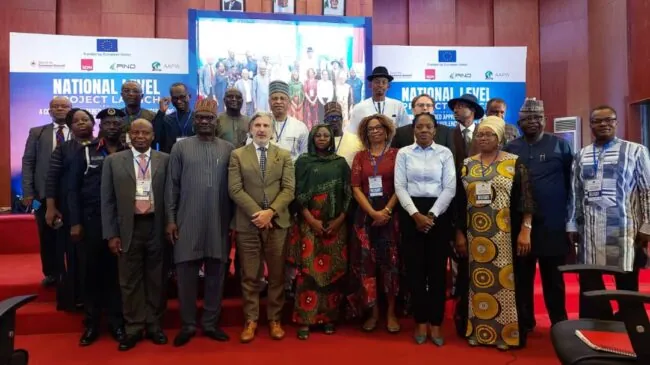Participants at the Niger Delta Regional Multi-Stakeholder Dialogue on Carbon Offset, an European Union (EU) funded initiative being implemented by Search For Common Ground, have issued far-reaching recommendations aimed at promoting carbon offset initiatives and sustainable environmental practices across the region.
The one-day dialogue, held in Asaba, Delta State, Thursday, 24th July, 2025, brought together representatives from government agencies, civil society organizations, traditional leaders, private sector players, academic institutions, development partners, and grassroots groups from across Rivers, Bayelsa, and Delta States.
A communiqué issued at the end of the meeting outlined key recommendations intended to guide regional efforts toward environmental sustainability and climate action.
Among the major resolutions was the call for the enactment and strengthening of regional laws and policies to address carbon emissions and support carbon offset initiatives in the Niger Delta. The stakeholders emphasized the urgent need for political commitment at all levels of government to drive policy implementation.
Another recommendation was the inclusion of youth, women, and persons with disabilities in community-level decision-making processes on environmental governance and carbon offset projects.
The dialogue also called for a reform in education, proposing the integration of climate change, carbon emissions, and environmental sustainability topics into school curricula at all levels to instill early awareness and responsibility among young people.
Stakeholders further resolved to build stronger collaboration with government actors to ensure the political will necessary for the success of carbon offset programmes, while also engaging civil society organizations as critical partners in advocacy, monitoring, and execution of climate-related policies.
A strong emphasis was placed on ecosystem restoration, particularly through large-scale planting of mangrove trees across the region. In addition, they recommended that all agreements with companies operating in the region should include contractual safeguards to prevent environmental exploitation and ensure benefit-sharing with local communities.
The communiqué also proposed that governments enter long-term binding agreements with companies for the replanting and preservation of mangrove forests as part of corporate environmental responsibility.
To improve public understanding, the participants called for continuous community sensitization campaigns on the benefits of carbon offsetting and the roles local residents can play in such initiatives. They also encouraged community-led environmental actions, such as waste recycling and clean-up efforts along rivers and public spaces.
In another key proposal, the forum advocated for the adoption of eco-friendly energy alternatives, including improved cooking stoves to reduce deforestation and promote healthier living conditions.
Read also:
- Nigeria, EU strengthen economic ties as Finance Minister hosts Ambassador
- Finland approves extradition of Simon Ekpa to Nigeria over terrorism allegations
- Nigeria top chat as Africans lose $67.5M to Schengen Visa rejections in 2024
Speaking to newsmen, Andy Nkemneme, National Conflict and Policy Analyst for Search for Common Ground explained that project was focused on addressing the root causes of violence and conflict in the region, adding that its goal is to create a more peaceful environment that supports development and improves the quality of life for the people.
He said, “What is happening today is part of a broader effort we are undertaking in the Niger Delta. Specifically, in the states of Bayelsa, Delta, and Rivers, Search for Common Ground, with funding from the European Union, is implementing a project we call Community-Centered Approach to Preventing Violence and Conflict in the Niger Delta’.
“Today’s event is one of several activities under this project. It focuses on the carbon offset sector, where we’re examining how to reduce harmful emissions and improve environmental health for the benefit of local communities. We recently conducted a research study on carbon offsetting in the Niger Delta. This dialogue is not only to showcase the findings of that research but to also bring stakeholders together to discuss the implications and generate actionable recommendations that can help move the region forward.”
Also Speaking, a community representative and environmentalist, Godsflag Agboun commended the sponsors of the initiatives, and advocated that oil multinationals should improve thier commitments towards their host communities.
He said, “these companies are not taking care of us. We are being neglected because of their operations. They take much more than they give. That is the reality. Also, the people in these communities are suffering. There are no hospitals. The companies involved in these emissions should build health facilities, even if it’s just one clinic for the people to take care of health problems caused by pollution.
“In addition, they should build schools. Education is important. Those who are responsible for these emissions need to understand the impact of what they are doing. Through education, they can learn how to reduce emissions and adopt better practices.”






